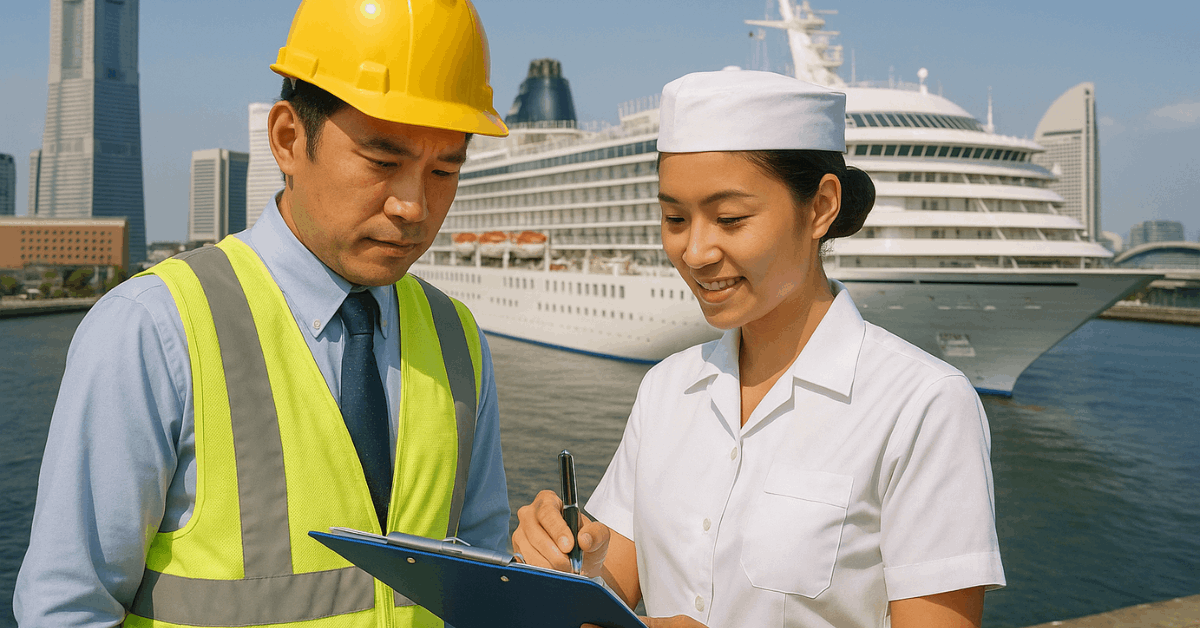Yokohama is one of Japan’s busiest cruise hubs, serving thousands of travelers every year. The Yokohama cruise job market offers a wide variety of opportunities both onboard and on shore.
These positions attract people seeking stable income, career growth, and global exposure. This article explains the available roles, salaries, benefits, and challenges you should know before applying.
Why Choose Yokohama for Cruise Industry Jobs?
Yokohama plays a key role in Japan’s international cruise industry. The city connects global routes and provides consistent job openings. Many workers choose this port for its strong demand and cultural exposure.
Understanding why Yokohama is important helps you see the value of pursuing these jobs. Working in this city gives you direct access to international tourists. You gain language practice, hospitality experience, and better career growth.
The tourism industry is growing quickly, so opportunities remain steady. Cruise lines and port authorities depend heavily on skilled staff here.

Categories of Jobs Available
There are two main categories of work: onboard roles and shore-based positions. Each category requires different skills and responsibilities.
Onboard staff focus on direct guest service and ship operations. Shore staff handle logistics, safety, and support tasks.
Onboard Roles
Onboard jobs involve living and working on the ship. These include hospitality, culinary, entertainment, housekeeping, engineering, and medical staff.
Each role is crucial for passenger experience and ship safety. Crew members often sign contracts lasting several months.
Shore-Based Roles
Shore jobs support cruise operations while remaining land-based. They include port logistics, customer service, baggage handling, security, and tour guides.
Employees in these roles maintain smooth boarding and departure for passengers. These jobs often provide more predictable schedules than onboard contracts.
Salary Range by Position
Salary expectations are an important part of planning your career. Each role offers a specific range based on responsibility and skills.
Onboard positions usually include meals and lodging, while shore roles may not. Knowing these figures helps you choose wisely.
- Hospitality and Guest Services: ¥220,000–¥300,000/month
- Culinary Staff: ¥250,000–¥350,000/month
- Entertainment Staff: ¥230,000–¥320,000/month
- Housekeeping and Maintenance: ¥200,000–¥280,000/month
- Deck and Engineering Crew: ¥300,000–¥500,000/month
- Medical Staff: ¥450,000–¥700,000/month
- Port Operations: ¥250,000–¥400,000/month
- Customer Service/Ticketing: ¥220,000–¥300,000/month
- Security Staff: ¥230,000–¥330,000/month
- Tour Guides: ¥250,000–¥380,000/month
Core Responsibilities in Each Role
Every role comes with specific duties that keep cruise operations smooth. Knowing these responsibilities helps you decide which position suits your skills best.
- Hospitality Staff: Manage reservations, handle guest requests, and solve problems quickly.
- Culinary Staff: Prepare meals under strict schedules and maintain food safety standards.
- Entertainment Workers: Keep passengers engaged with shows, games, and activities.
- Engineering Crew: Maintain ship systems and ensure all equipment works properly.
- Medical Staff: Provide health care, handle emergencies, and support passenger safety.
Required Skills and Qualifications
Most cruise jobs require specific skills to succeed. Having the right qualifications increases your ability to secure these positions.
- Language Proficiency: Japanese and English are often expected for effective communication.
- Hospitality Knowledge: Essential for guest services and passenger care.
- Certifications: Needed for engineering, deck, or medical roles.
- Interpersonal Skills: Important for customer-facing responsibilities.
- Technical Knowledge: Crucial for engineering and deck operations.
- Medical Licensing: Doctors and nurses must be licensed and trained for emergencies.
- Tourism or Service Experience: Previous work in these areas strengthens your application.
Benefits of Working in Cruise Industry
Benefits make these jobs attractive to both locals and foreigners. They provide stability, travel perks, and long-term opportunities.
Employees often highlight both financial and lifestyle advantages. Below is a list of key benefits you should know.
- International work experience and exposure
- Free meals and accommodations onboard
- Healthcare and insurance packages
- Paid leave and travel discounts
- Career training and certifications
- Competitive monthly salaries
- Opportunities for language and cultural exchange
Career Growth and Training Opportunities
Many positions in this field offer clear paths for advancement. Entry-level roles can lead to higher positions with experience. Training programs prepare staff for specialized or leadership roles.
Growth depends on performance and willingness to learn. Onboard staff can move from assistant to supervisor roles. Shore-based workers can advance into management or port authority positions.
Specialized training allows technical staff to secure higher-paying contracts. Cruise companies often provide professional development resources.

Challenges to Expect
Cruise jobs bring rewards but also difficulties you must consider. Knowing the main challenges helps you prepare for the work environment.
Long Working Hours
Staff often work extended shifts with little downtime. This demands stamina and discipline to maintain quality service.
Schedules can stretch across weekends and holidays. Time management becomes a crucial skill.
Extended Contracts
Onboard staff usually commit to months at sea. Long contracts mean being away from home for extended periods.
This requires mental strength and emotional readiness. Families must adjust to these absences.
Physical Demands
Many roles involve heavy lifting or long hours standing. Housekeeping and port handling staff face the toughest demands.
Physical health is essential to sustain performance. Rest and proper nutrition are key for endurance.
Cultural and Language Barriers
Working with international teams creates communication challenges. Misunderstandings can occur in guest interactions.
Staff need patience and adaptability to handle diverse cultures. Language skills help reduce stress and improve service.
Emotional Resilience
Stress levels can rise in high-pressure conditions. Workers must stay calm during emergencies or conflicts.
Resilience ensures smooth service delivery to passengers. A strong mindset supports long-term success.
How to Apply for Yokohama Cruise Jobs?
Finding the right application channel is the first step toward success. Understanding your options helps you choose the best path.
Cruise Line Websites
Most major cruise companies post job openings directly. Applicants can submit resumes and track application status online.
This method is efficient for onboard roles. It also provides clear details about contracts.
Recruitment Agencies
Specialized recruitment agencies connect candidates with cruise lines. They guide you through application steps and requirements.
Using agencies improves chances of securing positions. Many also provide interview preparation support.
Port Authority Websites
Yokohama’s port authority lists shore-based opportunities. These include logistics, customer service, and security jobs.
Checking these sites ensures you don’t miss local openings. Applications often require basic forms and supporting documents.
Tourism Associations
Local tourism organizations often network with cruise operators. They advertise seasonal or part-time positions.
Joining these groups opens additional career paths. Networking events also help you meet employers directly.
Tips on Applying
Simple strategies can improve your chances when applying. Following these tips helps you stand out from other candidates.
- Research each cruise line before applying to understand their culture.
- Customize your resume to highlight relevant skills and experiences.
- Prepare for interviews by practicing common hospitality and service questions.
- Keep documents like passports and certifications updated.
- Follow up with recruiters or agencies after submitting applications.
Conclusion: Why Yokohama Cruise Jobs Are Worth Considering?
The Yokohama cruise job market offers stable income, international exposure, and career growth. Both onboard and shore roles provide unique opportunities to learn and earn.
Salaries are competitive, and benefits improve the overall experience. If you want a career that combines travel, stability, and personal development, Yokohama is a strong choice.




















